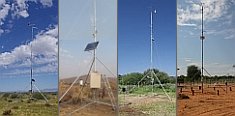|
Pollination is considered an ecosystem service crucial for the maintenance of natural and man-made habitats. Moreover, biotic pollination is extremely important for the production of agricultural goods; around one third of all food consumed by humans is directly or indirectly linked to pollinator services. During recent years, declines of certain types of pollinators, especially of bees, have been documented in many parts of the world, including Africa, and scientists are therefore highly concerned about the future of pollinator services.
This project is regarded a contribution to the aims of the International Pollinators Initiative, and is incorporated within the African Pollinators Initiative, the purposes of which have been formulated in the Nairobi Declaration 2002. The project aims at conservation and sustainable use of pollinators as an absolutely essential agro-ecosystem service, which, when conserved and managed properly, may improve food supply and generate additional income.
In order to conserve pollinator services it is necessary to (1) unveil the reasons for pollinator declines and to assess the consequences of a decline for natural and agricultural systems, and (2) to rise public awareness and concern about pollinators and their important services. These two major aims are here addressed through five independent but highly connected work packages. As a continuation of the pilote phase, the first WP is constricted to the forest and asks for the Influence of Forest Fragmentation on Pollination Interactions. The second, combining forested areas and the agricultural matrix, will assess the Role of Forest and other Landscape Elements as Pollinator Reservoirs. Based on a profound knowledge of the requirements for a successful Pollination of Crops and vegetables, we want to estimate the Monetary Value of Crop Pollinators as a convincing argument for pollinator conservation. As an eco-educational means a local Pollinator Garden shall be established.
Workpackages:
WP1
WP2
WP3
WP4
WP5
|






 Go to the WeatherNet
Go to the WeatherNet